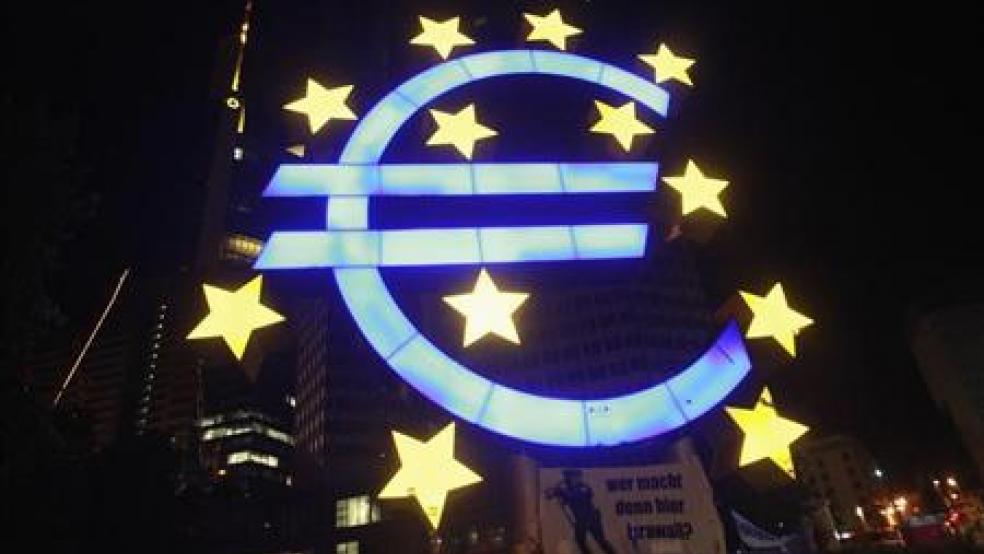Europe is in trouble… Again. This time, Europe is on the brink of disastrous trouble. This, unfortunately, seems to be news not yet delivered to many European Union technocrats—in particular, many Germans.
It starts to look reckless for policy makers in Brussels and Frankfurt to stand this close to the deflationary cliff and do nothing. On the bright side, a lot of formerly complacent Europeans are starting to get vertigo.
Remember when global markets got nervous about Europe’s outlook and swooned through October? (If you don’t, a look at you broker’s monthly statement may be in order.) That sell-off seemed an overreaction at the time, but now things are not so clear.
Related: European Plea on Bank Capital Falls on Deaf Ears
Mario Draghi, the European Central Bank’s president, has until the end of the year -- maybe a touch longer -- to prevail against the austerians ganged up against his proposals for expanded asset purchases intended to stimulate E.U. economies. If he fails, the eurozone’s army of unemployed and its disenfranchised youth will not suffer alone.
Europe’s a listing ocean liner. America’s vibrant rebound notwithstanding, the rest of us could get sucked under if it sinks below sea level. This is all the more so given Japan’s recent and unexpected spiral downward.
If sea level is zero inflation, Europe’s taking on more water. Last week Spain’s statistics agency warned that it is about to report a 0.4 percent fall in prices, year-to-year, for November. It’s not just the fifth straight drop; it’s a much bigger monthly drop, signaling that deflation in the Spanish economy is accelerating.
Same thing for the eurozone, slightly different scale. A day after Madrid’s announcement, Eurostat, the E.U.’s number crunchers, reported that inflation fell to 0.3 percent in November from 0.4 percent the previous month. Draghi’s target, now a kind of global standard, is a zone-wide inflation rate of 2 percent. Keep the bat steady and don’t flinch, Mario.
Related: QE or Not to QE: Spotlight on the ECB as Inflation Dips
Elsewhere in the news, The European Commission ruled Friday that France is not doing enough to meet the E.U.’s agreed limits on budget deficits. The Hollande government is now in line to become the first in the eurozone to face sanctions for violating the 1998-99 Stability and Growth Pact, wherein these limits are stipulated.
Italy is not far behind, the commission also warned. If either or both decide to ignore the E.U.’s rules—and this column argued several weeks ago they should consider doing so—it will be a major blow to European unity. (Regrettable but possibly necessary was the view advanced here.)
With the clouds this dark and low in the sky, the few bright lights seem to shine more brightly. The ECB has been purchasing asset-backed securities and covered bonds (instruments secured by returns from mortgages and public-sector loans) for several months. Draghi’s idea to extend this practice to large-scale government bonds now appears to be gaining momentum. Buying these bonds is intended to raise prices for risky assets.
The ECB will decide on this early next year, Vitor Constâncio, the ECB vice-president, just told the Financial Times. Constâncio comes over as a Draghi ally: He says the implicit risk is worth it and that the drift within the bank is that Mr. Whatever It Takes will get what he wants.
This would mark a significant turn in Europe’s economic thinking, away from German-inspired inflation paranoia in favor of the anti-austerian stimulus measures so plainly sensible now. The argument between those holding these opposing views rages as we speak, but there are reasons to think we are watching this shift now.
Related: EU Plans to Streamline But Not Change Budget Rules
One, Jean-Claude Juncker, the E.C. president, just unveiled plans to underwrite €315 billion ($393 billion) in spending on infrastructure projects—transportation, communications, energy, and so on—over the next few years. Juncker took flak immediately: The E.U.’s €21 billion in cash is not new money, and its loan guarantees for the rest may not inspire the private sector as planned.
O.K., maybe not enough, as so often with the Europeans. But let’s not miss the forest for the trees. A tilt toward Keynesian stimulus is implicit in Juncker’s plan.
Two, you’re reading and hearing a lot more comment favoring Draghi and Juncker among European opinion makers these days. Among the most stimulating comes from Wolfgang Münchau, the FT’s esteemed columnist. “The Left is right,” he argues, ticking off those in Europe favoring large-scale public investment: Syriza in Greece, Podemos in Spain, Die Linke in Germany. All are popular left parties; the last is the party of the former Communists, if you please.
The Commentator of the Week Award, let there be no question, goes to Pope Francis. That raging radical from the Vatican lit into the E.U.’s detached, politically invulnerable technocrats big time during an address last week to the European Parliament, which sits in Strasbourg.
Related: Why Italy’s Stay-Home Shoppers Terrify the Eurozone
“In recent years,” the pontiff asserted, “as the European Union has expanded, there has been growing mistrust on the part of citizens toward institutions considered to be aloof, engaged in laying down rules perceived as insensitive to individual peoples, if not downright harmful.”
You can call Francis a standard issue Latin American social democrat and you will have the guy properly sussed. But you can’t call him wrong on this one.
The pope chose his venue wisely: “Europe,” the idea of it, is not Europe’s problem. Europe’s problem is that Brussels and Frankfurt, answerable to no European citizenry, hold too much power and its political institutions too little.
Draghi’s proposed fixes for the eurozone are wise. But policy is not all that has to change. Structure does, too.
Top Reads from The Fiscal Times:






